Paul Yore is showing me his hear. He’s always wanted to create a sculpture using a car (“they’re quite phallic, aren’t they?”) and throughout the pandemic, like many of us, he has been thinking about death. So when he found a hear, he stripped all the paint off and turned it into a mosaic. In true Yore fashion, the car now has “FUCK ME DEAD” written in immaculate tiny tiles on the boot, over a numberplate that reads NO HOMO.
How does one just buy a hear? “I just found it online,” he says mildly. I have finished it in just three weeks. I ask to see his hands from him, expecting to see them mangled from years of sculpture and needlepoint, but all I see is neat nail polish and some surprisingly normal looking digits. “They’re not bad right now,” he says. “After big installations, I usually end up looking like I’ve been working with stray cats.”
At just 34, Yore’s art has become instantly recognizable in its spectacular, colorful vulgarity, taking on gender, sexuality, politics, religion, capitalism and advertising. His latest – and biggest – exhibition ever has just opened: a carnivalesque survey housed in Melbourne’s Australian Center for Contemporary Art (ACCA).
He is perhaps best known for his huge installations built from detritus, and this exhibition includes his biggest yet: a tower and dome covered in a mishmash of Happy Meal toys, costume jewellery, nana squares, neon lights, fast food signs, dildos, chickpea tins and hen nights paraphernalia. (“That’s an awful subcategory,” he says at one point, while looking mournfully at a line of penis straws.”)
Elsewhere in the show, his dainty needlepoint relays vulgar, bolshie messages about capitalism and colonialism in vibrant rainbow shades. His huge quilts of him are adorned with slogans that are both queer and homophobic, racist and anti-racist, with sequins, beads and quite a few erections. “You’ll be staring in a daze at one of these for a while,” one ACCA worker says to me, gesturing to one of Yore’s more lurid tapestries, “and suddenly realize you’ve just been looking at a penis for a very long time.”
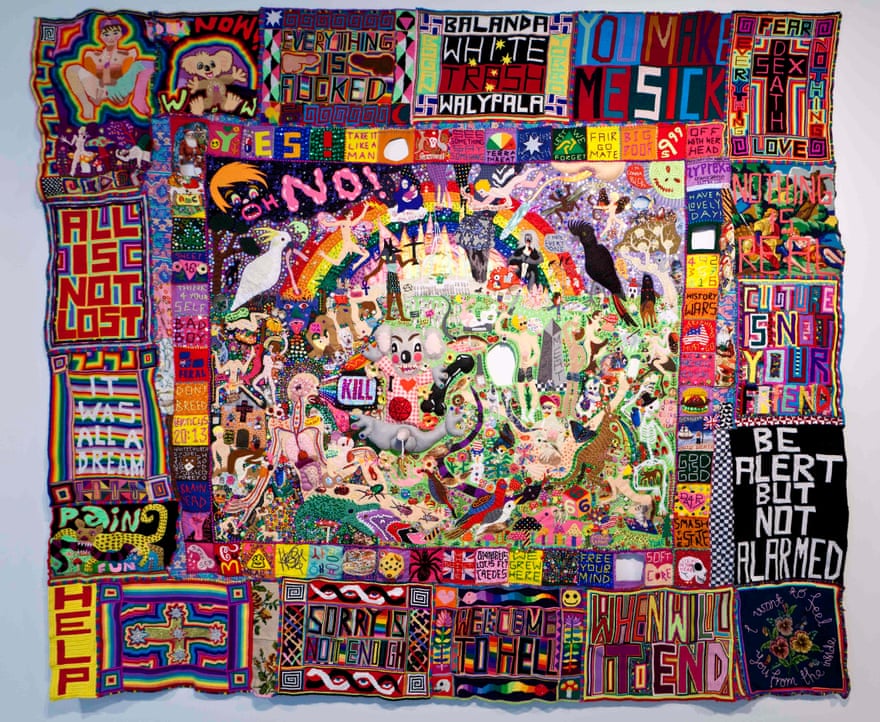
The mind behind it all is a slight, neat man who exudes calm, and who, as he shows me around, reveals glimpses of a pearl necklace under his black T-shirt. The show features more than 100 of his works by him, many of which have been gathered after years in galleries across Australia. Some he hasn’t seen in more than a decade. “It feels like a weird family reunion, seeing old works,” he says. “They’re like little babies that have come back into my life.”
While his art is so fun on the surface, Yore sees both it and himself as pessimistic. “My work comes from a very dark and cynical place. I don’t see it as joyful,” he says. “It’s made of plastic and it won’t degrade for a million years and it is nauseating.”
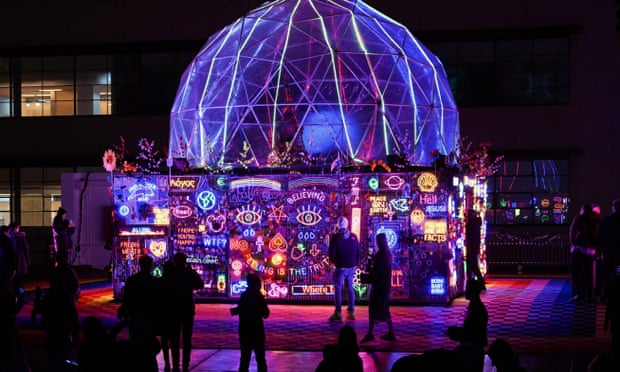
Part of the appeal is that darkness, he thinks. “We live in really troubled times and a lot of people sense that,” he says. “But as a queer person who has been assaulted or called names in the street, I think the value of marginal voices is that we have learned ways of surviving. A quilt, for example, a form I use repeatedly, is, on some level, about safety and comfort.”
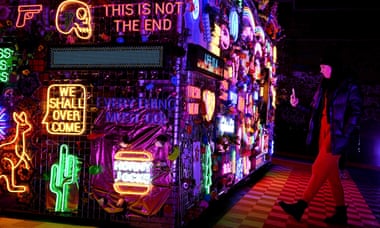
Yore was born in Melbourne, and raised by his English father, a former Franciscan friar, and an Australian mother, a missionary from Gippsland. Growing up in an extremely religious household was difficult for a young queer boy; his “hellish” years at Catholic school were filled with bullying. “But there’s a lot in Catholic art that is very camp,” he says. “The period of art I really love, 17th century baroque art, is high drama, it’s sensual, it’s very Hollywood. Some of it is almost erotic. So there is a lot of overlap between religion and queerness, in terms of decoration and spectacle.”
At university he studied archeology and anthropology, which both explains and feeds his magpie impulse to collect – or as he calls it, “rescuing”. He gathers up the detritus of capitalism from op shops and online marketplaces. When he starts to create his art from him, he “improvises”.
“I don’t know how it’s gonna look before it’s complete,” he says; instead, his hands intuit. “Even children understand it, when they’re making a collage – you take one thing and put it next to another thing, and it’s absurd and humorous when they don’t fit together.”
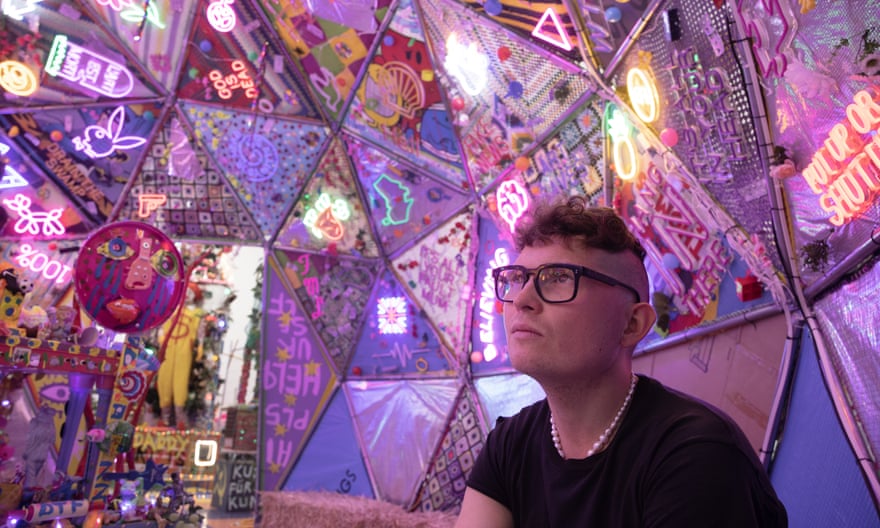
As for his intricate textiles, Yore took up a needlepoint after experiencing a mental health breakdown in 2010, which had its roots, he has said, in exhaustion. During that time, he was working, studying, creating and clubbing – and doing a lot of all four. He was sectioned against his will for two weeks in a psychiatric hospital in York, England, during a family holiday. Afterwards, while resting and weaning himself off of his medication, he taught himself to sew – a craft with a long political history, embraced as it was by suffragettes and trade unionists making banners for their protests.
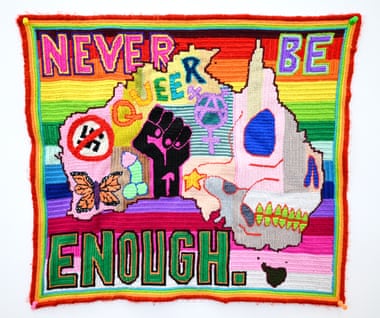
“A lot of my art does take a strong position… That’s fine by me, political art is a great tradition. But art by itself is not necessarily protest or activism,” he says. “What it does is propose questions that allows us to think radically. For example, after being here today, you might not look at those awful penis straws in the same way ever again.”
His blend of obscenity and vulgarity can rankle. In 2013, he was charged with producing and possessing child pornography, after police raided a St Kilda gallery that was displaying one of his collages which featured children’s faces superimposed on the bodies of men performing sex acts. The charges were dismissed; the magistrate rebuked Victorian police for damaging Yore’s art and ordered them to pay his legal fees.
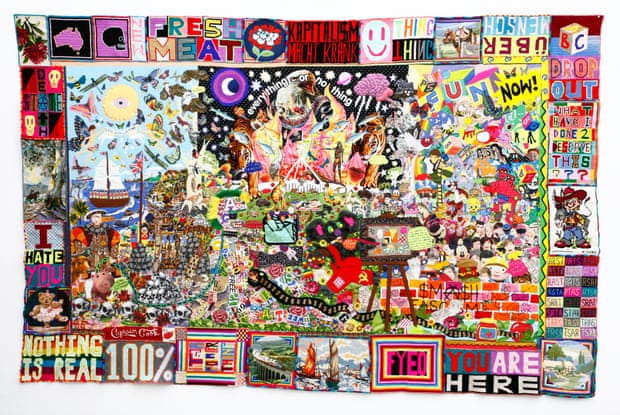
Does that experience weigh on his mind? “The older I get, the more I realize that there is a tension in what society expects art to be and what I make as a queer artist,” he says slowly. “It did impact me at the time. But it was over a decade ago, so I don’t think about it a lot any more.”
These days, he enjoys being seen as a populist: most people can enjoy a neon Hungry Jacks sign that says Horny Jocks, and not have to think about the deeper meaning behind it all. “People already have a relationship with my materials, which immediately deescalates the tension that you sometimes get in contemporary art, where someone’s like, ‘Oh, is this for me? Do I understand what’s happening here?’” he says. “Instead, it is ‘Oh, I used to have that toy’, ‘I know that logo’. It’s the stuff of real life.”
www.theguardian.com
George is Digismak’s reported cum editor with 13 years of experience in Journalism